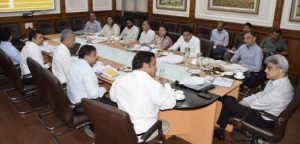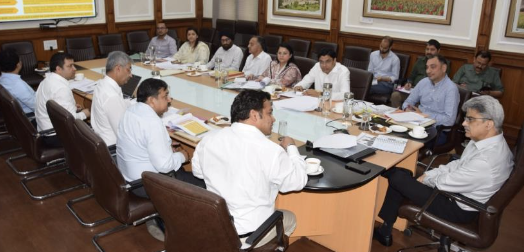JAMMU: Chief Secretary, Atal Dulloo, today took a review of the implementation of New Education Policy (NEP)-2020 in the schools across different parts of the UT by the School Education Department (SED). The meeting, besides Administrative Secretary, School Education, was attended by Director, School Education Kashmir/Jammu; Chairperson, JKBOSE & Director, SCERT; Director, Samagra Shiksha and other concerned from the Department. During the meeting, the Chief Secretary prompted the officers of the Department to set for themselves the measurable indicators with timelines against each for the 6 verticals under NEP. He asked for monitoring these on regular intervals for the smooth implementation of the policy here. The Chief Secretary also asked for creating ample awareness among the teachers of the Department about the features of this policy applicable to them. He made out that they are the concerned who have to get it implemented on ground. He advised for their capacity building and training to make them well-versed about its components. Dulloo also asked for gradually reducing the gaps being faced in its implementation so that each of these are ironed out within the stipulated timeframe. He also stressed on creating necessary infrastructure required for schools under this policy. The Chief Secretary took this occasion to enquire about the status of the establishment of ICT and Atal Tinkering Labs (ATLs) across the districts of J&K. He also took note of the development of smart classrooms in schools besides the establishment of Vidhya Samiksha Kendra (VSK). Regarding the provision of contribution on part of the volunteers to play their role in bettering the services, assets, materials, equipments in the schools, the Chief Secretary called for exploring the possibility of bringing in major players present in the UT to play their part under the CSR. In his presentation the Secretary, School Education, Piyush Singla elaborated the measures and steps taken by the department in this direction. He gave out that the major principles of the NEP-2020 includes respect for diversity & local context in curriculum, Equity & Inclusion, Community Participation, Use of Technology in teaching and learning. It also Emphasizes on Conceptual Understanding, Recognising Unique Capabilities, Developing Critical thinking and Creativity and Continuous Review by experts. Its key verticals includes curriculum and pedagogy, quality, teachers and their training, access and equity, governance and management and stress on research and innovation, the Secretary informed. The Director, SCERT, Parikshat Singh disclosed that the Department has conducted training sessions as envisaged under this policy for capacity building of teachers. He made out that till now 33 tasks had been completed, 52 are in progress under curriculum framework-2020. Under IMPACT, he gave out that more than 34000 Grade 2nd and 3rd teachers completed their one-month training course through online mode, 78975 Elementary Teachers (100%) completed the course under NISHTHA 1.0,21926 Secondary and Senior Secondary Teachers (81%) under NISHTHA 2.0and 40318 Pre-Primary and Primary Teachers (100%) have successfully completed the course under NISHTHA 3.0. Moreover it was added that in J&K 18 VTPs (Vocational Training Partners) are empaneled for imparting skills training in 1315 schools during 2023-24, 1803 Vocational Trainers/Teachers have been engaged. Approximately 126000 students from class 9th to 12th are enrolled in 15 different trades. It was revealed that 803 vocational labs have been established and made functional for the students and establishment of 532 labs are in process of establishment. Further in 1648 Upper Primary Schools, 74000 students have been provided exposure to the Basic Vocational Skills through local Artisans in 2023, the meeting was informed.


